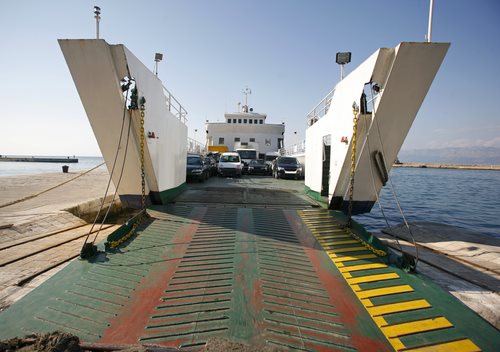
Navigating Waters of Contention: The Bridgeport & Port Jefferson Ferry Lawsuit
Introduction
The tranquil waters of Long Island Sound, which have long facilitated maritime trade and travel, became the center of an unexpected legal battle when the Bridgeport & Port Jefferson Ferry found itself embroiled in a lawsuit. The lawsuit, marked by its intriguing complexities and significant implications for both commerce and local communities, sheds light on the intricate interplay between transportation, environment, and the law. In this article, we delve into the details of the Bridgeport & Port Jefferson Ferry lawsuit, exploring the backstory, legal arguments, and the broader impacts of this maritime legal clash.
Setting Sail: The Bridgeport & Port Jefferson Ferry
The Bridgeport & Port Jefferson Ferry, a lifeline connecting Connecticut and Long Island, has served as a crucial transportation link for decades. Its service not only facilitates the movement of goods and people but also fosters economic vitality for the regions it serves. Operating since 1883, the ferry provides a unique experience, offering passengers stunning views of the Long Island Sound while bridging the gap between two bustling communities.
Navigating Environmental Concerns
As the ferry navigated the waters of the Long Island Sound, environmental concerns began to surface. The Sound, renowned for its ecological diversity and delicate ecosystem, raised questions about the impact of ferry operations on water quality, marine life, and the surrounding environment. Environmental advocates voiced apprehensions, calling for increased oversight and mitigation measures to protect the Sound’s delicate balance.
The Lawsuit Unveiled
The lawsuit emerged against the backdrop of environmental concerns, signaling a clash between the ferry’s economic importance and the need to safeguard the environment. Environmental organizations, together with concerned citizens, filed the lawsuit, alleging that the ferry’s operations were contributing to water pollution and ecosystem disruption in the Sound.
Legal Arguments: Balancing Commerce and Conservation
The legal battle revolved around two pivotal arguments. On one side, the plaintiffs contended that the ferry’s operations were contributing to the release of pollutants and waste into the Long Island Sound, thereby violating environmental regulations. They argued that the ferry’s impact on water quality and marine life was untenable and necessitated immediate intervention.
On the other side, the Bridgeport & Port Jefferson Ferry defended its operations as essential for local economies on both sides of the Sound. The ferry company maintained that it had implemented measures to minimize its ecological footprint, including wastewater treatment systems and pollution control technologies. The company emphasized the role of the ferry in bolstering regional tourism, facilitating trade, and supporting local businesses.
Implications Beyond the Waters
Beyond the immediate legal battle, the Bridgeport & Port Jefferson Ferry lawsuit carried broader implications for transportation, environmental policy, and regional cooperation. The case highlighted the challenge of striking a balance between economic growth and environmental protection in an interconnected world. As the legal proceedings unfolded, they sparked discussions about the necessity of innovative solutions that ensure the sustainability of transportation systems without compromising ecological integrity.
Settlement and Collaboration
Recognizing the multifaceted nature of the issue, stakeholders from both sides engaged in negotiations aimed at finding common ground. The lawsuit prompted a collaborative dialogue between the Bridgeport & Port Jefferson Ferry, environmental organizations, local governments, and regulatory agencies. This collaboration led to the development of a comprehensive plan that sought to mitigate the ferry’s environmental impact while preserving its role in regional connectivity and economic development.
Looking Ahead
The Bridgeport & Port Jefferson Ferry lawsuit underscores the complex and often delicate equilibrium that exists between transportation, economic interests, and environmental concerns. As societies continue to grapple with the challenges posed by climate change and sustainable development, legal disputes like this serve as a reminder of the need for innovative solutions that accommodate both human progress and environmental preservation.
Conclusion
The Bridgeport & Port Jefferson Ferry lawsuit, a chapter in the evolving narrative of transportation and environmental stewardship, demonstrates the intricate dance between commerce and conservation. Through legal battles, negotiations, and collaborative efforts, stakeholders sought to address both economic imperatives and environmental responsibilities. As this case unfolds, it highlights the imperative of finding harmonious solutions that ensure the sustainability of transportation systems while safeguarding the planet’s precious ecosystems.
What is the Bridgeport & Port Jefferson Ferry?
The ferry transports individuals and vehicles across Long Island Sound and carries people between Bridgeport, Connecticut and the Long Island village of Port Jefferson. There are currently three vessels that travel throughout Long Island Sound: the P.T. Barnum, the Park City, and the Grand Republic.
Quick Facts about the Bridgeport & Port Jefferson Ferry
The ferry respects pet owners and lets pets on the ferry at no extra charge. The pet must be leashed or in a pet carrier, and the pets are only allowed in the back and upper decks on the outside of the main cabin.
Smoking is still permitted on the ferries and is limited to the back and upper decks. The ferry has a strict policy on baggage and states that all passengers must stay with their baggage the whole time.
Bridgeport & Port Jefferson Ferry Lawsuit
In May of 2009, the United States Court of Appeals for the Second Circuit heard Bridgeport and Port Jefferson Steamboat Company v. Bridgeport Port Authority. The lawsuit occurred because the port authority increased fees for passengers taking the ferry from Port Jefferson to Bridgeport from $1.00 to $2.00.
The lawsuit occurred because the U.S. Constitution strictly regulates taxes and fees a port authority can charge a ferry and the passengers. During the appeal, the executive director for the Port Authority stated that passenger fee and the dock lease pay for most operating expenses, payments to port authority employees, taxes, and more. Many of these expenses were unrelated to the services and facilities provided to the ferry and related operations.
During a brief to the appeals court, Port Authority’s General Counsel stated, “Passenger vessels need dock facilities—some place to land. As most vessel operators do not own such facilities, they must negotiate and pay for their use. Many such facilities are owned or controlled by port authorities or other local government entities. These authorities generally have the power to assess user fees on the vessel or its passengers (or both). The temptation to over-assess is especially strong during times of financial crisis, when local governments face budget shortfalls that are politically and economically difficult to meet by increasing local taxes.”
According to the Supreme Court, passenger fees must be imposed for all international commerce in a way that is not discriminatory. The Court said there was no discrimination in the Bridgeport & Port Jefferson Ferry case, but fair approximation for passenger use was not considered.
The appeals court quoted a Supreme Court statement that said, “This Court has never held that the amount of a user fee must be precisely calibrated to the use that a party makes of Government services.” However, the court said the amount that the Port Authority took in were disproportionate and claimed the fees were excessive.
The court determined that the increased fee violated the Commerce Clause of the Constitution and ordered the Bridgeport Port Authority to pay the Bridgeport & Port Jefferson ferry $1,171,524.75.
Affects of Bridgeport & Port Jefferson Ferry Lawsuit in the Future
The Bridgeport & Port Jefferson Ferry Lawsuit is a legal case that has brought to light concerns about anti-competitive practices in the transportation industry. This lawsuit, which was filed in 2018, centers on allegations of predatory pricing and exclusive contracting agreements by one ferry operator, Bridgeport & Port Jefferson Steamboat Company, against another operator, Cross Sound Ferry Services. If the claims of the lawsuit are substantiated, they could have far-reaching implications for Americans in the future across several areas including competition, transportation, and regulation.
One of the most significant impacts that the Bridgeport & Port Jefferson Ferry Lawsuit could have on Americans in the future is on the transportation industry. The allegations of anti-competitive behavior suggest that some companies in the transportation industry may be limiting consumer choices and driving up prices through their actions. If the claims of the lawsuit are proven to be true, the case could spark a broader discussion about the need for increased competition in the transportation industry. With more competition, consumers would have greater access to a range of transportation options that better meet their needs and budgets.
Additionally, the Bridgeport & Port Jefferson Ferry Lawsuit could impact the legal system and the ability of consumers to hold companies accountable for anti-competitive behavior. Given the seriousness of the allegations, it is critical that the legal system provides appropriate remedies for consumers who have been harmed by these actions. If successful, the lawsuit could set a precedent for other consumers to seek legal remedies against companies that engage in similar practices. This could increase accountability among companies and, in turn, strengthen consumer protections.
The lawsuit also poses questions about the role of government regulation. Some supporters of deregulation argue that it promotes competition and innovation while reducing costs. However, it could be argued that deregulation increases the likelihood of anti-competitive behavior. The Bridgeport & Port Jefferson Ferry Lawsuit may add evidence to this debate and help shape the future of regulation in the transportation industry.
In addition to affecting transportation and regulation, the Bridgeport & Port Jefferson Ferry Lawsuit could have implications for local economies. The ferry services are crucial for commuters and tourists between Connecticut and New York, and any changes to the availability and cost of ferry services could have significant economic impacts on the local communities. The outcome of the lawsuit could affect property values, job availability, and local businesses.
The lawsuit raises concerns about infrastructure and the need for reliable and affordable transportation options, which is particularly salient as society becomes increasingly concerned with climate change. Widespread adoption of electric vehicles has been a hot topic for years, but it has yet to become a feasible option for many Americans due to the lack of charging infrastructure. The need for reliable and affordable transportation options that can cater to all Americans cannot be overstated, regardless of their location or economics status.
The outcome of the Bridgeport & Port Jefferson Ferry Lawsuit in the future could encourage future legal action and increased scrutiny of the transportation industry. If Bridgeport & Port Jefferson Steamboat Company is found guilty of the accusations against it, then it could provide precedent for further lawsuits and regulatory changes. This could lead to better protections for consumers and could ultimately lead to a more competitive transportation industry in the future.
The lawsuit also highlights the importance of innovation and collaboration in the transportation industry. As companies compete to provide innovative transportation services that best meet the needs of consumers, collaboration between companies and governments could lead to better long-term solutions. Innovative solutions such as carpool programs and ride-sharing provide affordable and flexible transportation options for millions of Americans. If companies in the transportation industry can work together with governments to provide reliable, safe, and affordable transportation, it could have a profound impact on the future of the industry as a whole.
In conclusion, the Bridgeport & Port Jefferson Ferry Lawsuit has the potential to impact Americans in the future on multiple fronts. Beyond its potential impact on transportation, regulation, and local economies, it highlights the importance of innovation in the transportation industry and the need for adaptable and collaborative transportation solutions. Americans will be eagerly watching the outcome of the lawsuit and the changes that follow from it. Regardless of the court’s decision, it is clear that the lawsuit has brought important issues to light and has generated debates that will continue into the future.











